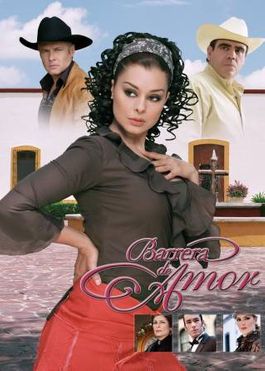Related Research Articles

Orizaba is a city and municipality in the Mexican state of Veracruz. It is located 20 km west of its sister city Córdoba, and is adjacent to Río Blanco and Ixtaczoquitlán, on Federal Highways 180 and 190. The city had a 2005 census population of 117,273 and is almost coextensive with its small municipality, with only a few small areas outside the city. The municipality's population was 117,289 and it has an area of 27.97 km2.
Events in the year 1994 in Mexico.

Barrera de amor is a Mexican telenovela produced by Ernesto Alonso for Televisa in 2005.

The House of Carrillo is a Spanish noble house that traces its origins from the ancient Kingdom of Castile. There are several branches that exist such as Carrillo de Albornoz, Carrillo de Mendoza, Carrillo de Figueroa, Carrillo de Toledo and Carrillo Tablas among others. There are also several variations in spelling of the surname Carrillo such as "Carillo" or "Sciarrillo". Records prove that both surnames are one and the same.

Manuel Carrillo Tablas was a Mexican philanthropist and served as mayor of Orizaba, Veracruz, Mexico. He was a descendant from the Carrillo family, a Spanish noble house. He served as the mayor several times.
La antorcha encendida is a Mexican telenovela produced by Ernesto Alonso and Carlos Sotomayor for Televisa in 1996. It was the last historical telenovela produced by Televisa. The plot tells the Independence of Mexico, with an emphasis on historical accuracy. It was written by Fausto Zeron Medina in collaboration with Liliana Abud. It premiered on Canal de las Estrellas on May 6, 1996 and ended on November 15, 1996.

Armando Manuel Aurelio Ortega Carrillo, known as Maestro Armando Ortega, was a Mexican musician, the Director of Coro de la Escuela Secundaria y de Bachilleres de Orizaba (ESBO). His maternal great-grandfather was the philanthropist Don Manuel Carrillo Tablas, who served many times as mayor of Orizaba, Veracruz, Mexico. His maternal grandfather was also a member of the Mexican Legislature at the turn of the 20th century. His paternal grandfather was the illustrious Professor Don Aurelio Ortega y Placeres, considered one of the most brilliant educators of public instruction the state of Veracuz, Mexico produced. His father was the renowned poet and educator, Professor Don Aurelio Ortega Castañeda, who baptized the city of Orizaba with the title of "Nuestra Señora de los Puentes"("Our Lady of the bridges").
Events in the year 1985 in Mexico.

Aurelio Ortega y Placeres (1863–1926) was director of the school San Luis Gonzaga in Orizaba, Veracruz, Mexico.
Aurelio Ortega Castañeda, known as Don Aurelio Ortega Castañeda, son of Aurelio Ortega y Placeres, was the editor of the famous magazine at the time La Calandria and of other works such as Panorama Orizabeño Almas Provincianas (1938); Nuestra Señora de los Puentes (1943); Pluviosilla Señorial y Legendaria (1955); among others like: "Anécdotas y otros cuentos"; "Orizaba "; "Almas Provincianas y Crepúsculo y Senderos de Historia ". He is the father of the renowned Mexican musician and artist Armando Ortega.
Events in the year 1997 in Mexico.
Events in the year 1993 in Mexico.
Events in the year 1986 in Mexico.
Events in the year 1984 in Mexico.
Events in the year 1983 in Mexico.
El vuelo del águila is a Mexican telenovela produced by Ernesto Alonso and Carlos Sotomayor for Televisa in 1994–1995. Telenovela based on the Mexican soldier and President of Mexico Porfirio Díaz, from his name had come out the title "Época Porfiriana" or "Porfiriato" during the period of his rule, in the years 1876–1911.
The Unknown Mariachi is a 1953 Mexican comedy film directed by Gilberto Martínez Solares and starring Germán Valdés, Rosa de Castilla and Gloria Mange.
Oh Darling! Look What You've Done To Me! is a 1951 Mexican romantic comedy film directed by Gilberto Martínez Solares and starring Germán Valdés, Rebeca Iturbide and Marcelo Chávez. A bakery delivery man falls in love with a middle-class woman after helping her following an accident, but her family object to him.

Eugenia León is a Mexican singer. In 1985, she won first place at the prestigious OTI Festival in Seville, Spain with the theme "El Fandango Aquí" by Marcial Alejandro. A winner of the Latin Grammy Lifetime Achievement Award, she has had a career spanning more than 35 years and 26 recorded albums, of which several million copies have been sold. She has performed in some of the most important venues in Mexico, such as the Palacio de Bellas Artes, the Auditorio Nacional, the Sala Nezahualcóyotl, the Teatro de la Ciudad, and the Cervantino Festival.
The following lists events that happened in 1924 in the United Mexican States.
References
- ↑ "Legislatura XXVII - Año II - Período Ordinario - Fecha 19171028 - Número de Diario: 45".
- ↑ Valdez, JOAQUIN Z.: Legislatura XXVII - Año I - Período Extraordinario - Fecha 19170620 - Número de Diario 62. 1917.